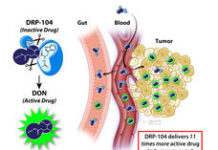Updated analysis of the anaplastic thyroid cancer cohort from an open-label, non- randomised phase II Rare Oncology Agnostic Research (ROAR) basket study confirms earlier observations that the combination of dabrafenib plus trametinib has meaningful clinical activity in patients with BRAF V600E–mutated advanced or metastatic anaplastic thyroid cancer. Updated analysis includes the full enrolment of 36 patients and approximately 4 years of additional follow-up. Investigator-assessed responses were observed in 56% of patients, with 50% of responders still in response at 12 months. Median overall survival (OS) was 15 months, with the 12-month OS rate of 52% notable given historic median OS of less than 6 months. The study findings are published on 10 January 2022 in the Annals of Oncology.
Anaplastic thyroid cancer is an undifferentiated form of thyroid cancer arising from follicular cells. It is rare, accounting for approximately 2% of all thyroid cancers, but it is the most aggressive form. Most patients present with extensive locoregional invasion, and distant metastases are found at diagnosis in 15% to 50% of cases.
Standard therapeutic approaches in other thyroid cancers, including thyroidectomy and radioiodine therapy, are less effective in anaplastic thyroid cancer due to the extent of disease and the fact that most anaplastic thyroid cancers do not take up iodine. Given the advanced stage at diagnosis, patients are typically considered for systemic therapy, but response rates with most systemic therapies, including chemotherapy and multikinase inhibitors, are approximately 15%. The OS with cytotoxic chemotherapy regimens alone or in combination with radiotherapy is poor and has not substantially improved in decades.
The only systemic therapy option specifically approved for the treatment of advanced anaplastic thyroid cancer is the combination of the BRAF inhibitor dabrafenib and MEK inhibitor trametinib. It is approved by the US Food and Drug Administration and more than 15 other regulatory authorities worldwide since 2018 for the treatment of locally advanced or metastatic BRAF V600E–mutated anaplastic thyroid cancer with no satisfactory locoregional treatment options.
BRAF V600E mutation is an early driver mutation common in differentiated thyroid tumours. Approximately 50% of patients with anaplastic thyroid cancer have had a prior or coexistent differentiated thyroid cancer (e.g., papillary). BRAF V600E mutation is found in 10% to 50% of anaplastic thyroid cancers and may be associated with poor prognosis.
The approval of dabrafenib plus trametinib for anaplastic thyroid cancer was based on earlier analyses of the phase II, open-label ROAR basket study in patients with BRAF V600E–mutated rare cancers. Initial results reported for the anaplastic thyroid cancer cohort, including 15 patients from the primary analysis cohort and 1 from the expansion cohort, demonstrated an investigator-assessed overall response rate (ORR) of 69% (11 of 16 patients), including 1 complete response (CR), with 12-month duration of response (DoR) rate of 90%, progression-free survival (PFS) rate of 79%, and OS rate of 80%.
A subsequent analysis following enrolment of an additional 12 patients in the expansion cohort yielded a consistent investigator-assessed ORR of 67% (18 of 27 evaluable patients), including an additional CR. Overall, 12 of 18 responders had a DoR longer than 6 months. Dabrafenib plus trametinib was well tolerated, and the safety profile was consistent with that observed in other tumour types in which the combination has been explored, such as melanoma, biliary tract cancer, and glioma.
To confirm and extend these findings, the study investigators performed updated analysis of efficacy and safety data from continued follow-up of the ROAR anaplastic thyroid cancer cohort, now representing the full enrolment of 36 patients with approximately 4 years of additional study follow-up. Patients with unresectable or metastatic anaplastic thyroid cancer received dabrafenib plus trametinib until disease progression, unacceptable toxicity, or death. The primary endpoint was investigator-assessed ORR per RECIST v1.1. Secondary endpoints included DoR, PFS, OS, and safety.
At data cut-off on 14 September 2020, median follow-up was 11.1 months (range, 0.9-76.6 months). The investigator-assessed ORR was 56% (95% confidence interval, 38.1%-72.1%), including 3 CRs.
The 12-month DoR rate was 50%. Median PFS and OS were 6.7 and 14.5 months with the 12-month PFS and OS rates of 43.2% and 51.7%, and the 24-month OS rate of 31.5%.
No new safety signals were identified with additional follow-up, and adverse events were consistent with the established tolerability of dabrafenib plus trametinib.
The authors concluded that updated results confirm the substantial clinical benefit and manageable toxicity of dabrafenib plus trametinib in BRAF V600E–mutated anaplastic thyroid cancer. Dabrafenib plus trametinib improved survival and represents a meaningful treatment option for this rare, aggressive cancer.
Dabrafenib plus trametinib has shown promise in a number of rare BRAF V600E–mutated cancer indications, including in other ROAR cohorts (biliary tract cancer, low-grade glioma, high-grade glioma) and in another tumour-agnostic study of BRAF V600E–mutaed solid tumours, lymphomas, and multiple myeloma. The updated results from the ROAR anaplastic thyroid cancer cohort add further evidence to broad potential of dabrafenib plus trametinib in the treatment of BRAF V600E–mutated cancers.
The study was sponsored by Novartis Pharmaceuticals Corporation.
Reference
Subbiah V, Kreitman RJ, Wainberg ZA, et al. Dabrafenib plus trametinib in patients with BRAF V600E–mutant anaplastic thyroid cancer: updated analysis from the phase II ROAR basket study. Annals of Oncology; Published online 10 January 2022. DOI: https://doi.org/10.1016/j.annonc.2021.12.014







